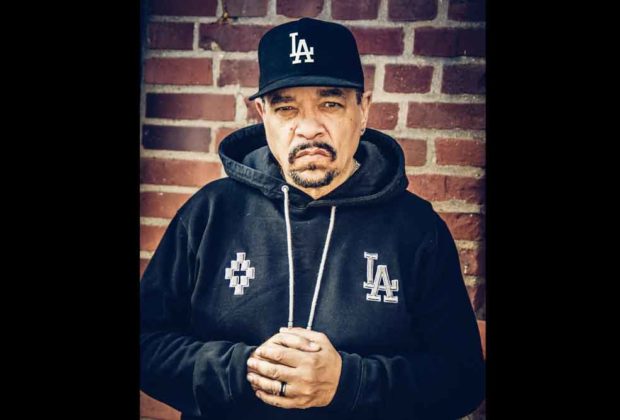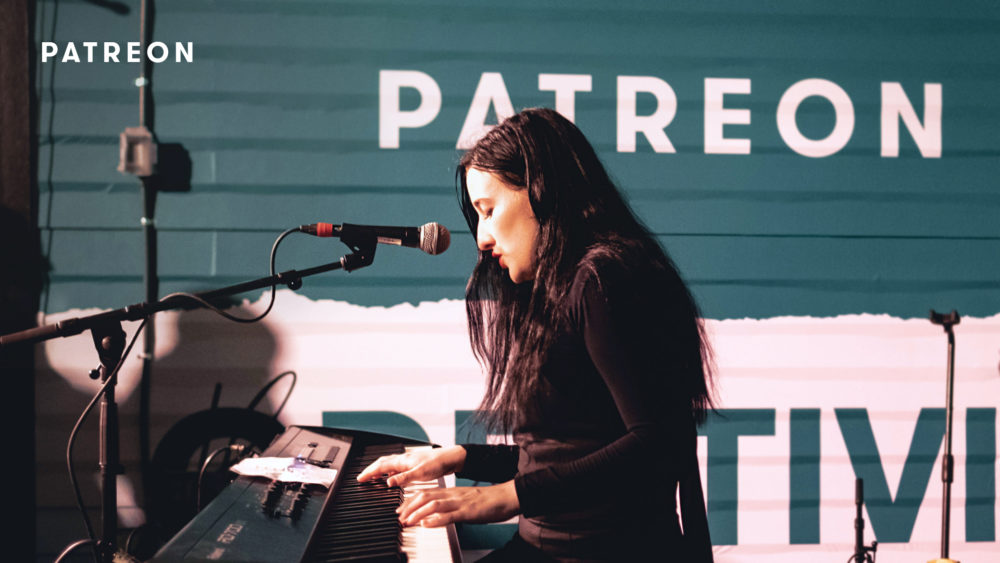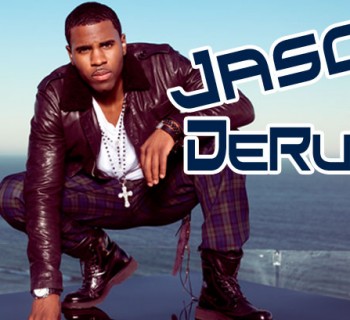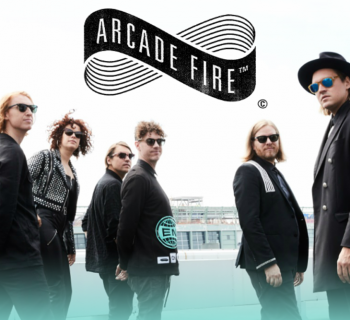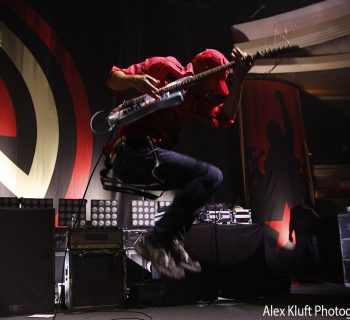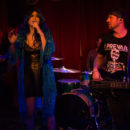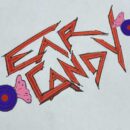Rapper-vocalist, producer, songwriter and actor Ice T has fronted the metal-tinged rap and rock band Body Count since 1990. In that time the group has released six groundbreaking, controversial and politically charged albums. Their seventh and most current full-length release, called Carnivore, continues in that tradition, with the single “Bum-Rush” being nominated for a Grammy. Original guitarist/backup vocalist Ernie C., Juan Garcia (guitar/backup vocals), Vincent Price (bass/backup vocals), Ill Will (drums), Sean E. Sean (samples/backup vocals) and Little Ice (backup vocals) complete the band.
Music Connection recently sat down with the legendary Ice T to get his take on the evolution of the band, his personal approach to the creative process and the band’s reaction to their upcoming Grammy Awards nomination.
MC: What is your process for preparing to do vocals for a Body Count record? And how, if at all, does your approach differ from some of your solo hip-hop work?
Ice T: With Body Count what I do is start by making the music. My agenda is to send the group in and for them to make 10-20 instrumental tracks that are dope without any words on them that could be played as instrumental, either the heavy riffs or the grooves. They go in and they make them. Then I go in and I say that part of that song is good, mesh those parts together and we create these instrumental tracks. Once the tracks are done that’s when I start writing. I start writing out ideas for songs, maybe a hook. I don’t write the lyrics. When I get the music and I’ve got 20 instrumentals, I listen to them and I actually kinda close my eyes and the track will tell me what the song is about. We go to Carnivore and you listen to the song “No Remorse”. That record was so heavy. It had to be some aggressive shit. So I wrote the song “No Remorse” and I try to match the vibe of the song and the music to the lyrics. Then, I write. When it’s time to record them I lay rough vocals down until I get a range and then usually when it’s time to blast the vocals and get them right I do one to two songs per session just so I don’t shred my vocals.
MC: The song “Bum-Rush” is up for a Grammy as “Best Metal Performance.” What can you tell me about the contents of the song? What was your process in creating the song? What events inspired it?
Ice T: Well the song “Bum-Rush” is based off the term being “woke”. Being “woke” means we are now conscious of the bullshit. If you’re asleep that means you’re falling for the bullshit. We ain’t asleep no more. We are "woke". Fear is coming. See the smoke. Smoke is a term for seeing the drama. This is coming. Literally the smoke from the fires from the riots--Here it comes. I write very literally like, "You can’t stop the Bum-Rush. A million strong and we all bust. We didn’t fall prey to your bullshit lies." It’s a song where I’m just saying, “we’ve figured out what you guys are doing". I’m pushing that vibe of “we’re coming”. Who would’ve known that next thing you know people are in the streets doing it this year with all the protests and stuff. The track is just an intense track. The drum beat has kind of the vibe of Prodigy, that kind of energy. It is what it is. Being nominated for a Grammy, who would’ve ever thought? It was just a track on the album. We knew it was a good track because we made a video. Every time we get a call and they say you're nominated for a Grammy we say “are you sure it’s us"?
MC: You’ve been at the helm of the rap and rock movement that has inspired so many artists and bands. What were the bands that influenced you to create this musical fusion?
Ice T: There were no bands doing what we were doing. I mean the closest thing could’ve been Red Hot Chili Peppers back in the day, but I created the band based off of wanting to let Ernie C play his guitar. I was listening to normal metal and punk rock like Black Flag, Slayer, Suicidal. Those are the groups that really influenced us. I was like these guys aren’t really singing. They’re kinda just shouting, so I can do that. We didn’t attempt to become Journey, somebody who was really blowing. We just picked the style. New York hardcore was very influential. I was like, we can do this! We never called it rap rock, though. I don’t really like that term cause it’s not really rap rock. Rap is different. Rap is funky. I guess if you bark the vocals out in a cadence and it rhymes, you can call it rap rock. I don’t know if Rage Against The Machine is rap rock. Rap is different. I just call it hardcore.
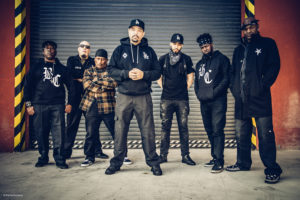
MC: How does your new album “Carnivore” contrast or differ from your previous work with Body Count? What kind of sound were you going for with this record?
Ice T: All my albums are just continuations. Manslaughter was our return with Will Putney at the helm producing. Manslaughter, Bloodlust and Carnivore can be played all together. You can put them all together and shuffle the tracks and they’ll all have the same energy. I don’t really reach out of the box for a sound or try to come up with anything different. I feel like people who like Metallica want to hear another Metallica album not Metallica venturing off into some new realm. If I was going to venture into a new realm, I would just create a new name for the band. I try to make songs that once you hear them, the next time you hear them there’s a part you can sing along with or riff that you remember. In that way, that’s my songwriting process. I want to make songs that people can sing along to or vibe along to. Just keep it hard and aggressive and in the pocket. Also, I try to deal with different things. Like on a Body Count album there will be a political record. There will be some evil shit on it. There will be something that’s kinda violent. There will be a fun record like “Critical Beatdown” that tries to keep all the Body Count flavors intact.
MC: What do you personally do to keep yourself and your vocals in optimum condition? And what kind of workout do you do to vocally or physically prepare before a show?
Ice T: The only thing you can do for your vocals is just try not to overdo it. The worst way to rip your vocals is to not be able to hear yourself and try to compete with the instruments. That’s why when I do rehearsals I don’t really do vocals while the band is practicing because they’ve got their guitars turned up so damn loud that my brain will say I need to be louder than that. Even If they turn it up in the PA it will never be loud enough. So I kinda lay back during rehearsals. I’ve always had issues with vocals. Being on tour and you’re out there and adrenaline’s going and you're ripping and your screaming and you’re doing one-nighters; it can be rough. Usually, when I hit tour, the first night I shred my voice. Then I get a tour voice and it comes back and it’s more powerful. I ripped all the high vocal chords out of my throat. If you ever notice heavy metal cats like Henry Rollins, they can talk really low but they can’t talk really high. All that yelling can really destroy your high vocal chords. Then I listen to the death metal guys and they’re growling. I think one of the craziest vocalists I’ve ever heard is the guy from Suicide Silence who shrieks. I’m like “how the fuck do you do that”? I don’t really have any tricks. I just don’t talk on tour. I save my vocals for the stage. There’s no trick once you shred them to making them come back. People are like oh you can drink this. Oh you can do this. Nahh! You’ve just gotta stop using them. Unless if someone out there knows a trick. Please tell me!
MC: Please describe an amusing story you can share about, first a stage highlight, and then a stage mishap, either as a solo artist or with Body Count?
Ice T: Stage highlights always happen when different people run on the stage. I’ve been on the stage with Marilyn Mason. Of course Henry Rollins would come on stage. You never really know who’s gonna be there and decide to run out and rock “Cop Killer” out with you. The highlights are when we hit those mega shows like when we did Download Festival and there’ 150,000 people, and you just can’t see the end of them. It’s like to the horizon and you’re just standing there like, “Wow! All these motherfuckers are looking at me.” Here’s a highlight...we opened for Metallica and Guns N Roses at Jackie Robinson Stadium and we had a big ramp that goes out into the audience. I had always seen Mick Jagger run out on these ramps. So we are out in the middle of the stage cause they had all these props. And we are just this little band jamming, and I decide to run out on this ramp. Little did I know that was 50 yards to 100 yards long. When I got all the way out to the end of the ramp I was out of breath. I looked back and the band was the size of my fingernail. They were so little. And then I looked up on the Jumbotron, and I was on the Jumbotron, and I had never seen myself on a Jumbotron. I was like, “what the fuck?” The crowd was just bugging. Then, I didn’t have enough energy to make it back to the band by the end of the song. So I learned about running out on those ramps. That was a stage highlight. A stage mishap was on one of the Lollapalooza tours. During lunch a guy's mother served us gumbo and when it was time for us to perform I had full blown diarrhea. I was in the porta potty and I heard my intro music come on. I had to make one last squeeze and clinch my butt cheeks and run to the stage. I did a whole 45 minute set holding my butt cheeks together. One little fart would’ve been Niagara Falls.
MC: You’re a producer as well as an artist. What is your work ethic in the studio? As an artist and producer do you tend to do a lot of takes when recording? What do you look for in selecting a studio to work in?
Ice T: I like to work, but I like pre-production. I don’t like to get in the studio. I’ve had studios in my house before. I had a big studio in LA called the Crackhouse. I’m not a studio rat. I don’t like sitting in the studio. My first pick is a good engineer. I like having a good engineer, who knows how to move fast. If I say put some reverb on this they know how to do it and they know how to move. Right now we are using a lot of Pro Tools. I need someone who knows what the fuck they are doing. The worst thing is when you’re in the studio and the engineer is pulling out the manual like he doesn’t even know how to run shit. That’s important. If you’ve got a good engineer you can work in the studio and then leave. They’ll mix it for you and get it closer to the finishing product. Then you can come in and do your last listen and say “that’s dope, just pull this up a little bit.” I like working with experts. Going into the studio, I like everybody knowing what they are going to do. Everybody can make the music at home. Everybody knows what it’s supposed to sound like. So when we get in there it’s not too much creating. We’ll lay something then we’ll go home and we’ll think about it. So, when we go into the studio I like to know what we are doing. I’m not like, “let’s go in there and get high and bullshit around.” You’re paying a lot of money in studios so I don’t like wasting time. That’s really my procedure. I’ve been with people who go into the studio and fall asleep and hangout and have girls in there and bullshit around. When I go into the studio it’s strictly business. Let’s get it done. Now, Body Count, they have to go into rehearsals to actually get the music together and get it tight enough to where we can take it in and track it. I’m not really involved with that because I don’t have to do vocals then. By the time we’ve tracked the music, when I go in to do vocals, they’re not even there. It’s kind of like I’m making a rap record because I’m doing vocals, I’m doing overdubs, I’m doing adlibs by myself with just the engineer, Will Putney, who’s been the engineer for the last few records.
MC: What kinds of parallels do you see between preparing for an acting role and approaching a song or working with a band? How has one discipline complemented the other?
Ice T: It’s actually easy to compare to making music because acting, unless you wrote the script, you’re just doing what you’re told. You’re coming in. You’re saying the lines. They’re telling you what to wear and where to stand. Acting is lying convincingly. You’re just acting like somebody else. Unless you’re playing some Daniel Day-Lewis role, where you are playing someone opposite of who you are, acting isn’t extremely difficult. Now I know actors get extremely mad when I say that, and I’m not the greatest actor, but for me it’s not that hard because, doing television, I already know who my character is. I just come in. I know how he acts. I just say the words and stand on the tape and you’re gonna do it until the director says you’re done. Now, if you flip that to music, you’re going to do it until the producer says you’re done, unless you’re producing yourself. So if you go in and you’re with a producer and you’re singing your vocals he might say do them heavy or do them like that. If he’s in charge, it’s like you’re acting. You’re trying to hit what he wants. Sometimes that’s good to have someone make you better. It’s different. Music nowadays, you are in charge of the script. You are in charge of how everything goes. You have to write. You’re walking into an empty studio with nothing and you have to make it from scratch. So there is a lot more on you to make a record than acting in movies, unless you write the movie, and are directing and editing it. With music, you are in control of the whole thing. It’s a little bit harder.
MC: I see where you cover “Ace of Spades” by Motorhead and “When I’m Gone” by Nipsey Hussle on this latest Body Count album. What do you look for in a cover? What kind of treatment do you bring to the table to make a cover song your own?
Ice T: “When I’m Gone” isn’t a cover. It’s an original record. It’s a tribute to Nipsey Hussle. It was inspired by his passing and how the outpouring of love came after his death. That triggered me to write the record. As far as covering a song, we pick groups that have inspired us. We’ve covered Suicidal on Manslaughter and Slayer on Bloodlust. We’ve covered Motorhead. People say, “Where is the Motorhead inspiration.” I’m like, “well, listen to ‘Cop Killer’.” “Cop Killer” is like Motorhead. I fortunately was friends with Lemmy. I got to work with Lemmy on a song called “Born to Raise Hell”. The thing is we picked “Ace of Spaces” before I even thought about the fact I had to sing it. I just got in there and I channeled Lemmy and everybody says I did alright.
MC: What is some of the new or modern sounds that really capture your attention today?
Ice T: For metal, I don’t really listen to other people because I try to keep my ideas and sounds pure. I think the group that captured our attention most recently was Power Trip, and that’s why we teamed up with them. We felt a little Body Count(ness) in their vibe and their heavy riffs. We ended up working with Riley on “Point The Finger” and it just seemed very natural. I don’t really listen to lots of metal because that’s the best way you end up sounding like someone else. I’m listening to smooth music. I’m listening to artists like Roc Marciano and different types of rap. Most of the time I’m listening to very mellow music, until I have to go into the studio. Then, I try to destroy your eardrums.
MC: As a solo artist and, especially with Body Count, you’ve always had a strong social consciousness to your music. What is the responsibility of an artist (either an actor or a musician) to make commentary or take a social or political stance with their art? Have you personally felt any backlash or push back from musical positions you have taken in your career?
Ice T: I think there is zero responsibility. I’m political at times in my real life and that transfers into my music. Some artists aren’t political. Some artists don’t have any stance. That’s the last person you need speaking about something. And as far as blowback, if you protest anything, you’ve got to expect blowback. That’s what it’s about. There will be someone who is against you or disagrees with you. Like when Colin Kaepernick decided to kneel, he had to be prepared because someone is going to have a problem with it. If you’re not prepared for that, you shouldn’t do it. If I go out and say something against someone, they have the right to come back at me. Like I said, “Freedom of speech, just watch what you say.” Not everyone is cut out for it. They just want to say what they have to say and not have any blowback. That’s a part of it. That’s how you get your stripes because people realize you said this, you meant this and you stood on it. I’m so familiar with it that I don’t really have a problem with it. I also don’t try to say anything that I’m not willing to back. If I’m going to say it, I’m going to back it. •

